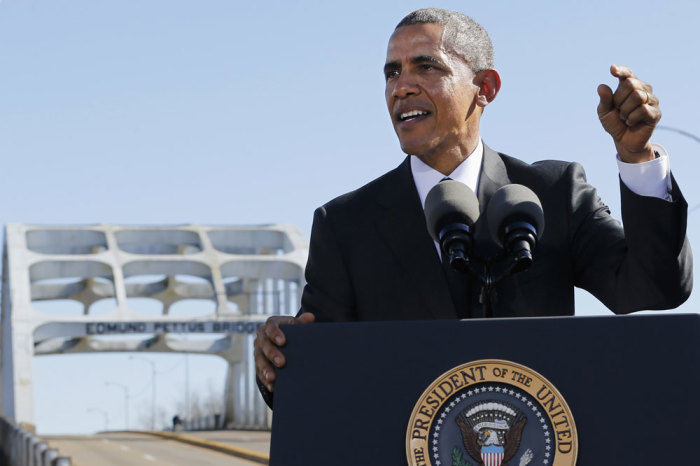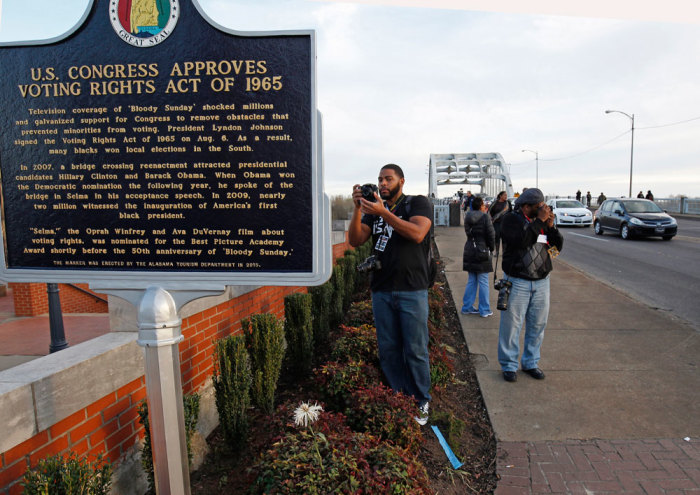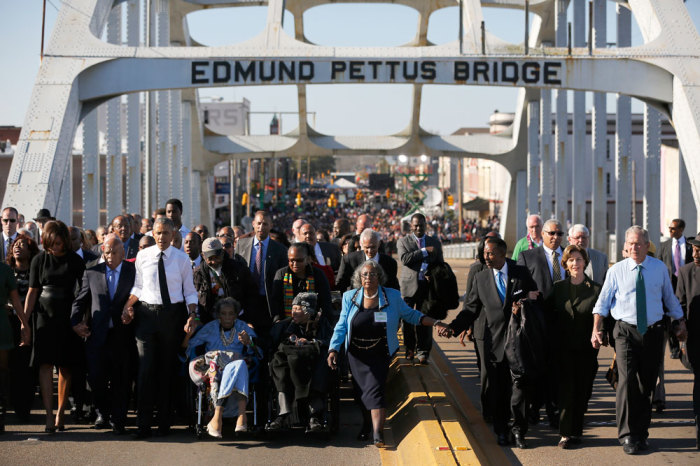Obama's Speech at 50th Anniversary of Selma 'Bloody Sunday' (Text Transcript, Full Video)

President Barack Obama delivered his speech for the 50th anniversary of the "Bloody Sunday" civil rights march in Selma, Alabama, on March 7.
Below is the full text transcript of the speech and a video of the president's address:
It is a rare honor in this life to follow one of your heroes. And John Lewis is one of my heroes.
Now, I have to imagine that when a younger John Lewis woke up that morning 50 years ago and made his way to Brown Chapel, heroics were not on his mind. A day like this was not on his mind. Young folks with bedrolls and backpacks were milling about. Veterans of the movement trained newcomers in the tactics of non-violence; the right way to protect yourself when attacked. A doctor described what tear gas does to the body, while marchers scribbled down instructions for contacting their loved ones. The air was thick with doubt, anticipation and fear. And they comforted themselves with the final verse of the final hymn they sung:
"No matter what may be the test, God will take care of you;
Lean, weary one, upon His breast, God will take care of you."
And then, his knapsack stocked with an apple, a toothbrush, and a book on government -- all you need for a night behind bars -- John Lewis led them out of the church on a mission to change America.
President and Mrs. Bush, Governor Bentley, Mayor Evans, Sewell, Reverend Strong, members of Congress, elected officials, foot soldiers, friends, fellow Americans:
As John noted, there are places and moments in America where this nation's destiny has been decided. Many are sites of war -- Concord and Lexington, Appomattox, Gettysburg. Others are sites that symbolize the daring of America's character -- Independence Hall and Seneca Falls, Kitty Hawk and Cape Canaveral.
Selma is such a place. In one afternoon 50 years ago, so much of our turbulent history -- the stain of slavery and anguish of civil war; the yoke of segregation and tyranny of Jim Crow; the death of four little girls in Birmingham; and the dream of a Baptist preacher -- all that history met on this bridge.
It was not a clash of armies, but a clash of wills; a contest to determine the true meaning of America. And because of men and women like John Lewis, Joseph Lowery, Hosea Williams, Amelia Boynton, Diane Nash, Ralph Abernathy, C.T. Vivian, Andrew Young, Fred Shuttlesworth, Dr. Martin Luther King, Jr., and so many others, the idea of a just America and a fair America, an inclusive America, and a generous America -- that idea ultimately triumphed.
As is true across the landscape of American history, we cannot examine this moment in isolation. The march on Selma was part of a broader campaign that spanned generations; the leaders that day part of a long line of heroes.

We gather here to celebrate them. We gather here to honor the courage of ordinary Americans willing to endure billy clubs and the chastening rod; tear gas and the trampling hoof; men and women who despite the gush of blood and splintered bone would stay true to their North Star and keep marching towards justice.
They did as Scripture instructed: "Rejoice in hope, be patient in tribulation, be constant in prayer." And in the days to come, they went back again and again. When the trumpet call sounded for more to join, the people came –- black and white, young and old, Christian and Jew, waving the American flag and singing the same anthems full of faith and hope. A white newsman, Bill Plante, who covered the marches then and who is with us here today, quipped that the growing number of white people lowered the quality of the singing. (Laughter.) To those who marched, though, those old gospel songs must have never sounded so sweet.
In time, their chorus would well up and reach President Johnson. And he would send them protection, and speak to the nation, echoing their call for America and the world to hear: "We shall overcome." (Applause.) What enormous faith these men and women had. Faith in God, but also faith in America.
The Americans who crossed this bridge, they were not physically imposing. But they gave courage to millions. They held no elected office. But they led a nation. They marched as Americans who had endured hundreds of years of brutal violence, countless daily indignities –- but they didn't seek special treatment, just the equal treatment promised to them almost a century before. (Applause.)
What they did here will reverberate through the ages. Not because the change they won was preordained; not because their victory was complete; but because they proved that nonviolent change is possible, that love and hope can conquer hate.
As we commemorate their achievement, we are well-served to remember that at the time of the marches, many in power condemned rather than praised them. Back then, they were called Communists, or half-breeds, or outside agitators, sexual and moral degenerates, and worse –- they were called everything but the name their parents gave them. Their faith was questioned. Their lives were threatened. Their patriotism challenged.
And yet, what could be more American than what happened in this place? (Applause.) What could more profoundly vindicate the idea of America than plain and humble people –- unsung, the downtrodden, the dreamers not of high station, not born to wealth or privilege, not of one religious tradition but many, coming together to shape their country's course?
What greater expression of faith in the American experiment than this, what greater form of patriotism is there than the belief that America is not yet finished, that we are strong enough to be self-critical, that each successive generation can look upon our imperfections and decide that it is in our power to remake this nation to more closely align with our highest ideals? (Applause.)
That's why Selma is not some outlier in the American experience. That's why it's not a museum or a static monument to behold from a distance. It is instead the manifestation of a creed written into our founding documents: "We the People…in order to form a more perfect union." "We hold these truths to be self-evident, that all men are created equal." (Applause.)
These are not just words. They're a living thing, a call to action, a roadmap for citizenship and an insistence in the capacity of free men and women to shape our own destiny. For founders like Franklin and Jefferson, for leaders like Lincoln and FDR, the success of our experiment in self-government rested on engaging all of our citizens in this work. And that's what we celebrate here in Selma. That's what this movement was all about, one leg in our long journey toward freedom. (Applause.)

The American instinct that led these young men and women to pick up the torch and cross this bridge, that's the same instinct that moved patriots to choose revolution over tyranny. It's the same instinct that drew immigrants from across oceans and the Rio Grande; the same instinct that led women to reach for the ballot, workers to organize against an unjust status quo; the same instinct that led us to plant a flag at Iwo Jima and on the surface of the Moon. (Applause.)




























